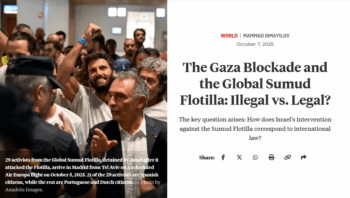Late in the evening of October 1, the Israeli Navy intercepted the Global Sumud Flotilla (GSF), a fleet of more than 50 vessels that had set off in August and September from ports around the world. The flotilla carried humanitarian aid and hundreds of activists determined to break the illegal Israeli siege of Gaza. Video footage from that night shows armed soldiers climbing aboard the boats, confronting the unarmed activists who sat in a circle wearing life vests with their hands raised.
Despite having all the elements of a major news story—and a dramatic one—media coverage of Israel’s interception of the GSF has been patchy and notably lacking in key details. Establishment media omitted crucial context connecting this incident to earlier events, overlooked important legal conversations, both-sidesed the delivery of humanitarian aid during a famine, and largely ignored reports of mistreatment endured by detained activists and journalists.
‘Unclear origin’

The Washington Post (10/2/25) quoted activists saying the Israeli blockade was “illegal,” and Israel saying it was “lawful,” but gave readers no clue which was true.
In the coverage that followed the seizure (10/1/25–10/3/25), leading outlets failed to frame the seizure of the flotilla as part of Israel’s longstanding efforts to block similar missions (FAIR.org, 6/5/25, 7/1/10)—including its multiple drone strikes on the GSF throughout September.
Neither the New York Times (10/1/25) nor the Wall Street Journal (10/1/25) made any reference to the drone strikes. While both the BBC (10/2/25) and the Washington Post (10/2/25) briefly touched on them, they carefully avoided implicating Israel and leaned instead into vague language. For example, the BBC stated that the strikes were of “unclear origin,” omitting its own earlier reporting (9/10/25) in which a weapons expert noted that a device recovered after the second attack had features “common but not exclusive to some models of Israeli hand grenades.”
Even when news broke in early October that Israeli Prime Minister Benjamin Netanyahu had ordered the drone strikes, corporate media largely ignored it, with CBS (10/3/25) one of the few outlets to report the story.
Similarly, the New York Times article neglected to mention Israel’s longstanding history of obstructing humanitarian flotillas. Other outlets referenced past interceptions, but only in a sentence or two, failing to convey the full scope of the pattern. For example, the BBC report simply said that “Israel has already blocked two attempts by activists to deliver aid by ship to Gaza, in June and July,” overlooking the fact that such actions have been occurring for decades (Quds, 10/3/25).
‘Contempt for legally binding orders’

Mammad Ismayilov (Politics Today, 10/7/25): “Israel’s intervention cannot be justified under any recognized legal exception and therefore constitutes a clear violation of international law.”
The interception of the GSF has been denounced by a number of human rights organizations, including Amnesty International, the International Federation for Human Rights, and the World Organization Against Torture. According to a press release from Amnesty International (10/2/25):
By continuing to actively block vital aid to a population against whom Israel is committing genocide, including by inflicting famine, Israel is once again demonstrating its utter contempt for the legally binding orders of the International Court of Justice, and its own obligations as the occupying power to ensure Palestinians in Gaza have access to sufficient food and lifesaving humanitarian assistance.
This sentiment has been echoed by international law experts. In an article for Politics Today (10/7/25), legal scholar Mammad Ismayilov wrote that Israel’s naval blockade
must comply with International Humanitarian Law (IHL). A blockade that harms civilians and undermines their living conditions is a clear violation of IHL. The Gaza blockade deliberately subjects the Palestinian population to mass starvation, meeting the the criteria of Article 2(c) of the Genocide Convention, which prohibits deliberately inflicting conditions intended to destroy a group, either wholly or in part. Therefore, the Gaza blockade qualifies as genocide under international law.
Ismayilov also noted:
The Israeli Navy intercepted all of the vessels, seizing the ships and detaining hundreds of activists while they were still in international waters, approximately 70–75 nautical miles (130–139 km) off the coast of Gaza. This action, occurring so far from the coast, challenges the fundamental principle of international law that guarantees the freedom of navigation on the high seas.
Likewise, in an article for the Conversation (10/2/25), David Rothwell, professor of international law at the Australian National University, cited breaches of the Geneva Conventions and the UN Convention on the Law of the Sea, describing the interceptions as “a clear violation of international law.”
One of the few major media outlets to cover this extensive legal discourse in any depth was the Associated Press (10/2/25). The piece cited three experts on international law, all Israeli—two of whom defended the legality of seizing the flotilla, while the other condemned it. Another legal rights group based in Israel, qualified as “representing the activists,” called the interception “a brazen violation of international law.”
Ample space for Israeli justification

The Washington Post (10/2/25) included a tweet from the Israeli Foreign Ministry referring to more than 40 boats carrying some 440 humanitarian activists as “Greta and her friends.”
News outlets took care to balance the humanitarian activists trying to bring food to a starving population with defenders of a genocidal regime. For example, coverage in the New York Times (10/1/25) and the Washington Post (10/2/25) gave roughly equal space to the perspective of the Israeli Foreign Ministry and the GSF. The Times dedicated four paragraphs each to the Israeli Foreign Ministry and the GSF, while the Post allotted four paragraphs and a tweet to Israel, and six paragraphs to the GSF. This type of framing reflects a longstanding and well-documented tendency in corporate media to normalize and rationalize the most extreme Israeli actions (FAIR.org, 6/18/25).
As mentioned above, the Washington Post incorporated a tweet from the Israeli Foreign Ministry, featuring a video of a soldier handing Thunberg water and a coat, with the caption:
Already several vessels of the Hamas-Sumud flotilla have been safely stopped and their passengers are being transferred to an Israeli port. Greta and her friends are safe and healthy.
The New York Times, CNN (10/2/25), NBC (10/1/25) and BBC (10/2/25) included this and other similar quotes from Israeli officials, with the BBC noting that “Israel claims it is attempting to stop those supplies from falling into the hands of Hamas.” The Wall Street Journal (10/1/25) even seemed to justify the naval blockade itself, writing that “Israel has controlled the waters around Gaza since 2009, when it declared a naval blockade to stop what it said was a pipeline for weapons and extremists.”
Treated as ‘supporters of terrorism’

Israeli National Security Minister Itamar Ben-Gvir (AP via PBS, 10/5/25) said flotilla detainees “should get a good feel for the conditions in Ketziot prison”—a facility notorious for torture.
Following their return from Israel, many GSF participants have alleged mistreatment and torture at the hands of Israeli forces during their detainment. Al Jazeera (10/4/25, 10/5/25, 10/7/25) extensively documented these claims across multiple articles, detailing incidents such as Thunberg reportedly being “dragged on the ground” and “forced to kiss the Israeli flag.” Other detainees were allegedly blindfolded, zip-tied, denied medication and access to legal representation, and subjected to intimidation with firearms and guard dogs, amongst other abuses.
Most corporate media have either ignored that story or, as in the case of the New York Times (10/6/25), offered limited coverage. The Times omitted specific claims entirely, instead quoting Thunberg—“I could talk for a very, very long time about our mistreatment and abuses in our imprisonment, trust me, but that is not the story”—and leaving it at that.
The Times also misleadingly framed the detainees as “on a hunger strike while in custody,” which, although true for some participants, according to an Instagram post from the GSF, obscured allegations from many activists that they were scarcely fed, and forced to drink toilet water during their imprisonment.
The Times conspicuously left out quotes from far-right Israeli National Security Minister Ben-Gvir (AP via PBS, 10/5/25), who said that he was “proud that we treat the ‘flotilla activists’ as supporters of terrorism. Anyone who supports terrorism is a terrorist and deserves the conditions of terrorists.”
More accurate coverage appeared in a handful of other news outlets—including AP (10/5/25), CNN (10/6/25) and the Guardian (10/6/25)—although none offered reporting as thorough as Al Jazeera’s.
‘Targeting international journalists’

The Committee to Protect Journalists noted that Israel is “engaging in the deadliest and most deliberate effort to kill and silence journalists that CPJ has ever documented” (Objective , 10/8/25).
Moreover, there has been limited reporting on the presence and treatment of journalists aboard the GSF and similar flotillas, with many outlets overlooking the reporters’ detainment and alleged torture. Reporters Without Borders (RSF) was one of the only organizations to address the detainment of journalists during the interception of the GSF, noting that at least 20 journalists were imprisoned by Israeli authorities.
In a press release (10/8/25), RSF highlighted accounts of mistreatment endured by these journalists, and drew an important connection between this moment and Israel’s systematic attacks against the press:
The Israeli army has already killed over 210 journalists in Gaza and the authorities continue obstructing press freedom, now targeting international journalists, who are already barred from entering the territory. RSF calls for the protection of these reporters and all Palestinian journalists, and repeats its demand that the Gaza Strip be opened to foreign media.
No major US media outlets have published reports focusing on the detainment and mistreatment of journalists aboard the GSF. Even the October 8 internment by Israeli authorities of Emily Wilder, an American reporter for Jewish Currents who was aboard the Conscience with the Freedom Flotilla, hasn’t gotten any attention from major media. Only a handful of smaller publications, such as the Objective (10/8/25) and the Jewish Telegraphic Agency (10/9/25), have covered the story. (Wilder was released on October 10.)
While this silence is perhaps unsurprising, given Wilder’s fraught history with corporate media (FAIR.org, 5/22/21), and the broader tendency of leading outlets to marginalize independent coverage of Palestine (FAIR.org, 3/28/25), it nonetheless underscores the disturbing pattern of bias and hypocrisy in media coverage related to Gaza.
This post was originally published on FAIR.




